71.1% of professionals in our State of Link-Building report believe ranking through content alone—without link building—is possible.
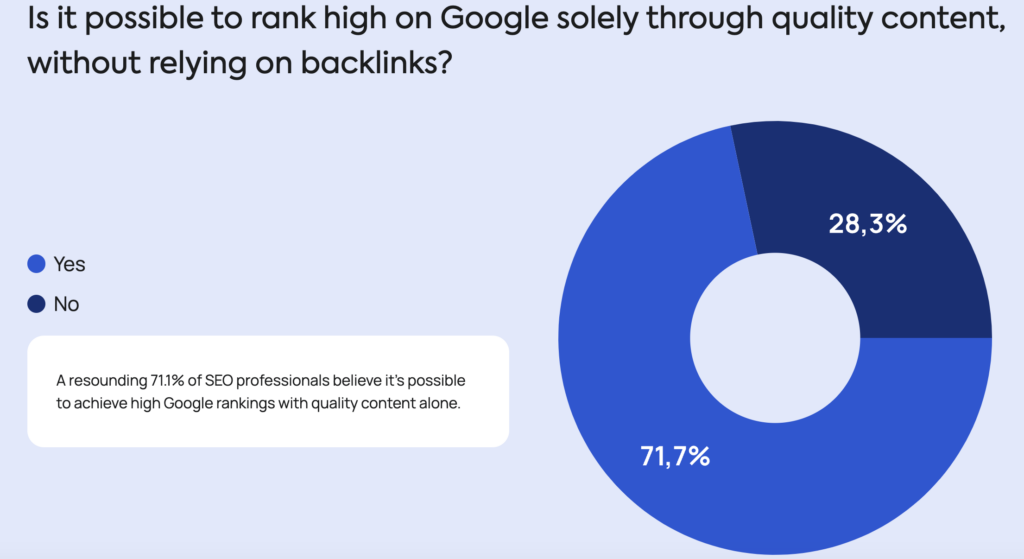
However, a study by Internet Marketing Ninjas found that 95% of websites ranking in the top 10 for commercial keywords had at least 1000 backlinks. And, despite Google’s claims, a Google API leak earlier this year confirmed that links remain a key ranking factor.
So, where’s the truth? Is successful SEO possible without backlinks?
In this article, I’ll talk you through a few scenarios where it might be possible to rank well without building links, and I will share some tips on how to maximize your chances.
Is it Possible to Rank High Without Backlinks?
While challenging, I’ve seen situations where ranking high with few or no links is possible. I’ve chatted with three SEOs to see if they’ve had similar experiences.
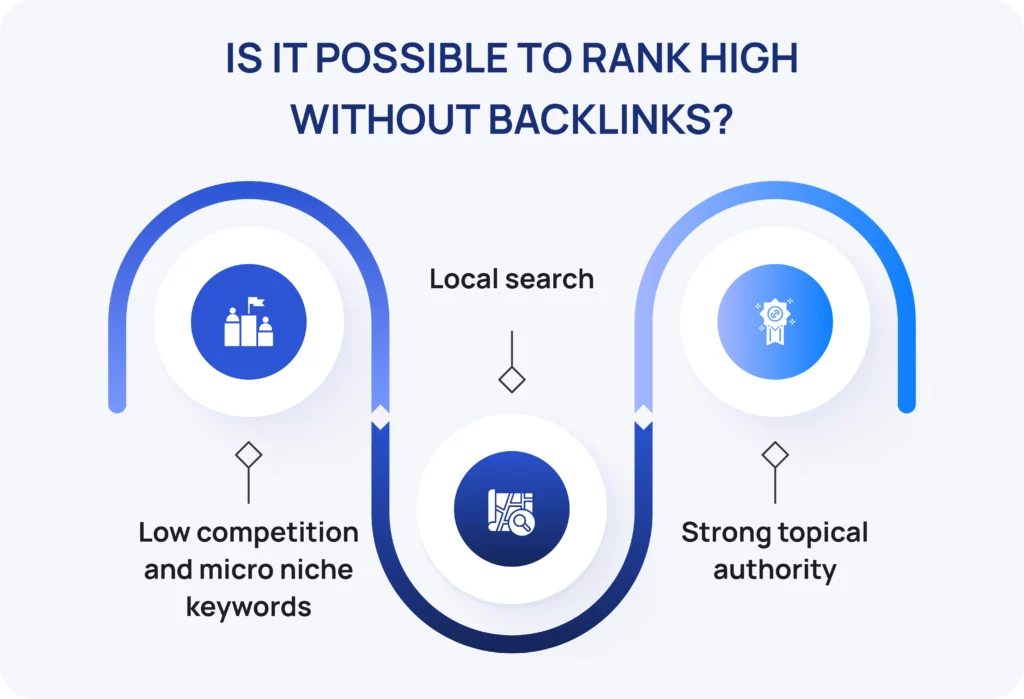
Low competition and micro niche keywords
One way to rank without backlinks is to target low-competition keywords. These tend to be long-tail keywords with informational intent.
For example, 'how to grow cox apples' is an easy keyword to rank for. The top-ranking result has no backlinks.

In contrast, ranking for ‘apple’—a highly competitive branded keyword driving an estimated 3.4M in monthly traffic worth $5.4M—is extremely difficult. Ahrefs estimates you'd need links from 1.7K domains, and you would be against the likes of Amazon, Walmart, and Apple itself.
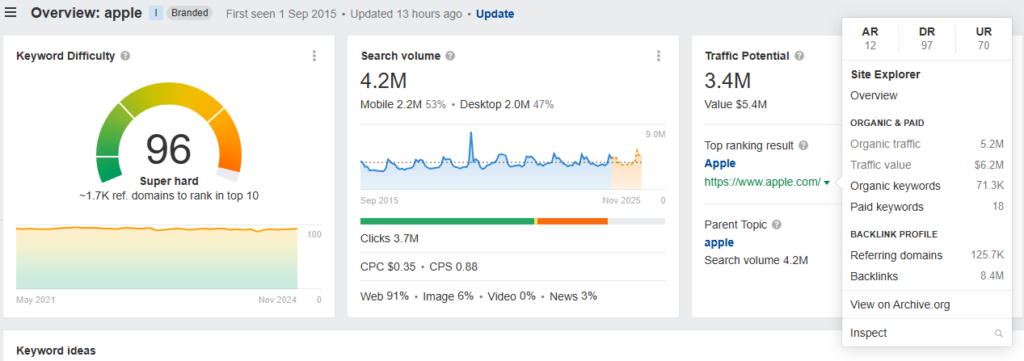
Marin Cristian-Ovidiu, the CEO of Online Games, shares my thoughts. Targeting low-competition keywords has worked as a treat for him.
If you focus on very specific or low competition keywords, great content can rank without any backlinks. For example, I’ve ranked for “best browser games for beginners” and “free multiplayer puzzle games.
How do you find such keywords?
Use a keyword research tool like Ahrefs Keyword Explorer or Semrush Keyword Magic Tool.
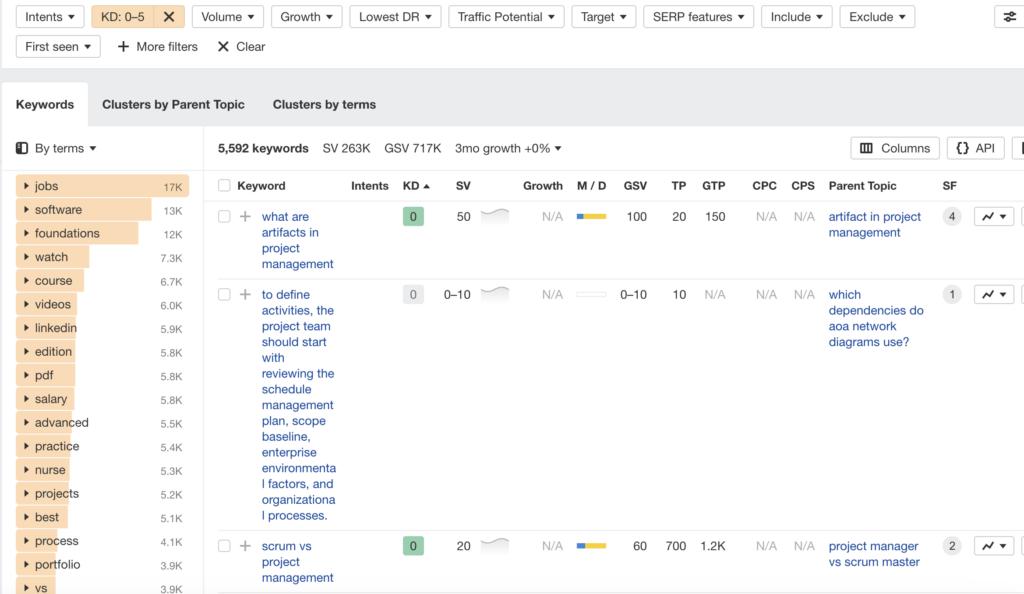
In my experience, ranking for high-intent commercial and transactional keywords without a strong link-building strategy is difficult—but not impossible.
Nathaniel Miller, the Head of Marketing at The SEO Marketing Dad, managed to pull it off while working for a B2B printing equipment vendor. Instead of targeting general high-volume keywords, he focused on high-intent technical terms. For example, SKU codes like f9j82a or b4h70-67176.
I created content centered around SKU numbers—since my client was a reseller, there was a built-in audience actively searching for those SKUs… This approach led to a 900% increase in online sales in the first year, and an additional 200% growth in year two.

Local search
Local businesses can often rank well without backlinks — by optimizing their Google My Business (GMB) profiles.
For example, the search for 'plumber' reveals a list of plumbers in my area:
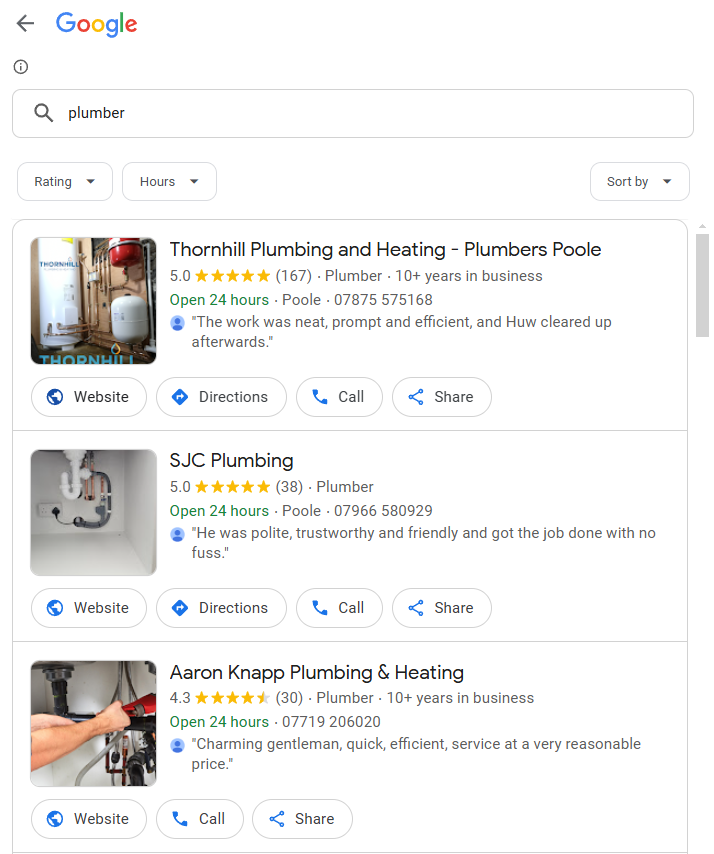
Browsing through the results, I see profiles linking websites with no backlinks whatsoever.

The same is true in the main search results. The websites ranking in 5-7 spots have no backlinks at all.

How do you optimize your GMB profile to boost local SEO performance?
- Add all necessary data: Your business name, address, opening hours, contact details, and what you do. Make sure the details are consistent with all your other online profiles, for example, in directory listings.
- Include relevant keywords
- Add photos and videos. They can increase click-through rates by 35%
- Manage customer reviews: Encourage customers to leave reviews and respond to them.
- Post regular updates and locally relevant content like guides. To show your business is active and engage the potential audience.
You don’t need backlinks to rank for those searches—you need a solid Google Business profile, location-specific keywords, and consistent information (your name, address, and phone number) across your website, directories, and online listings.
Strong topical authority
Topical authority is another key to high search engine rankings without backlinks.
Topical authority in SEO showcases a website's expertise, relevance, and credibility within a specific niche. It plays a vital role in signaling to search engines that your site is a reliable and comprehensive source of information on a particular topic.
Basically, If your website comprehensively covers a topic and provides real value to users, search engines perceive it as more credible and trustworthy. This translates into better performance in SERPs.
Achieving this requires publishing tons of content that explores the subject from multiple angles.
Take NapLab, a mattress review website, as an example.
Despite a fairly low DR49, it ranks for "mattress reviews" and related keywords like "best mattresses 2024," outperforming websites with much better metrics, including powerful sites with hundreds if not thousands of backlinks like Forbes, Reddit, or Tom's Guide.
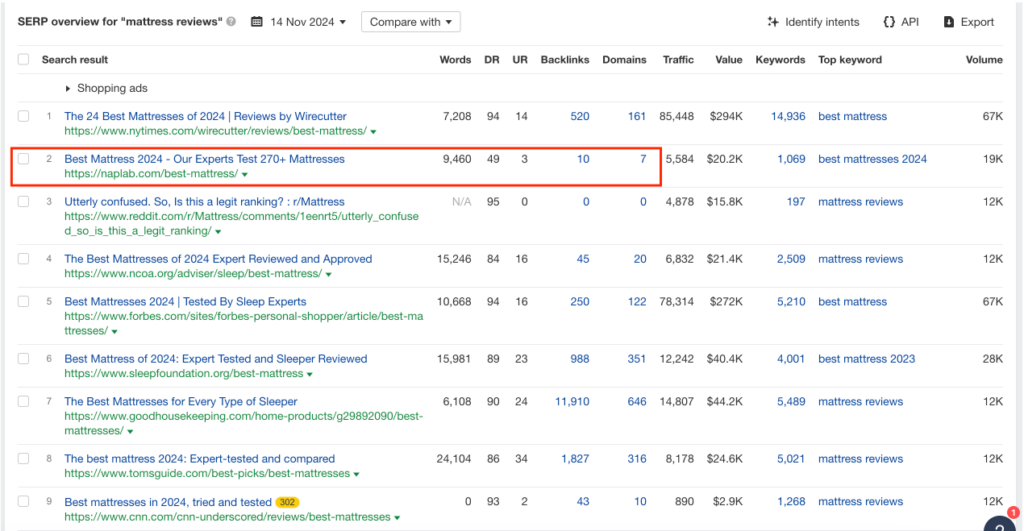
To get where they are, NapLab published over 800 articles in their niche. By working meticulously through keywords, cluster by cluster, they established themselves as a go-to resource on everything related to mattresses and sleeping.
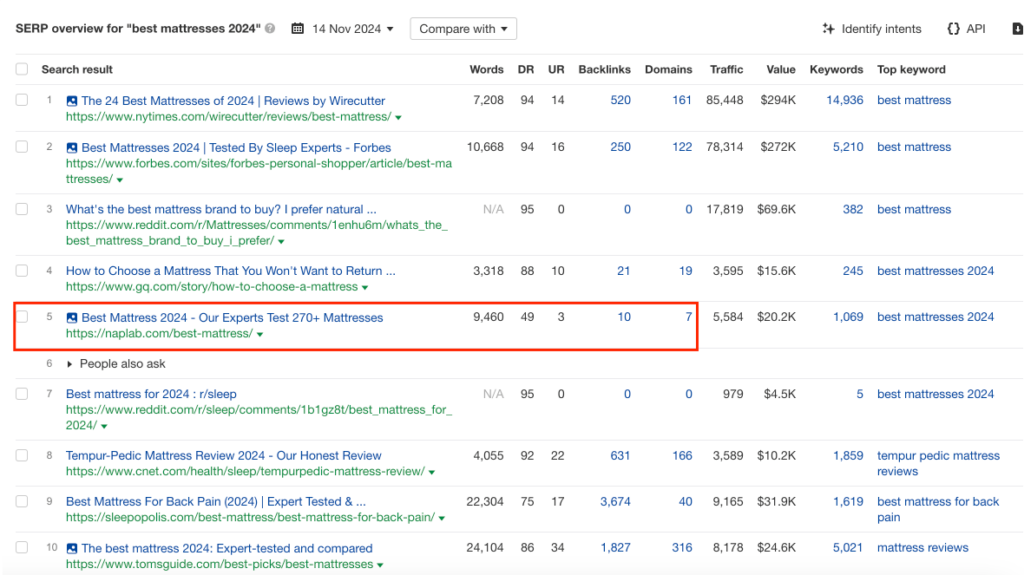
OspLabs is another good example of a page with strong topical authority that successfully challenges much bigger competitors.
If you look at the sitemap, you’ll see they’ve published around 300 articles in their sector (healthcare software development).
The result? They outperform websites with superior metrics. And not just for low-competition keywords.
For example, they rank in the #1 spot for “coding systems in healthcare”, beating pages with more links and domains with higher DR.
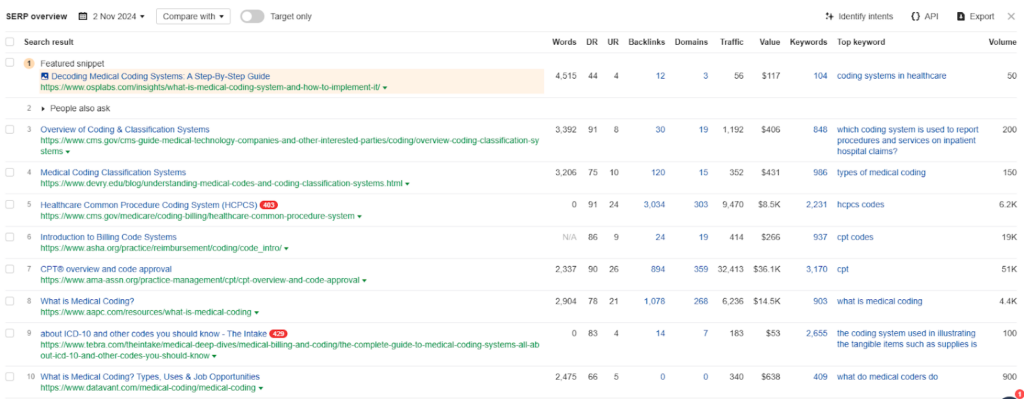
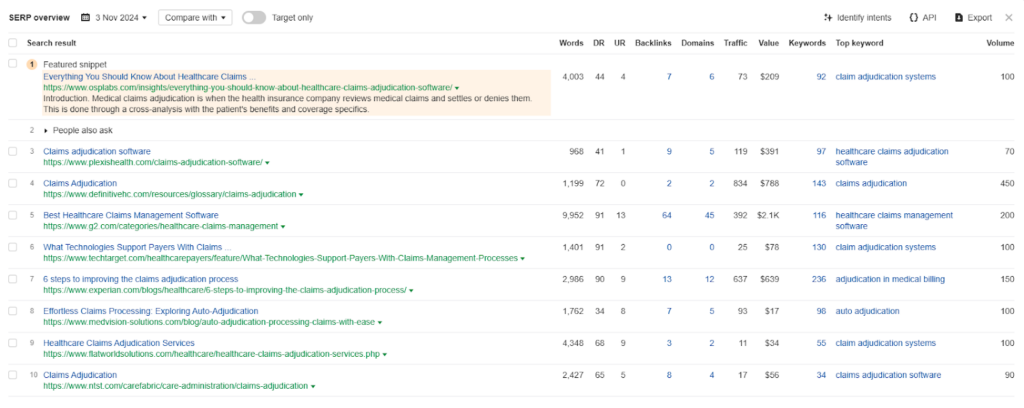
So, How To Rank High Without Link Building?
To finish, let's go over what you can do to help you rank without building dozens of links.
Create valuable content
High-quality content is the foundation of any SEO strategy—whether or not you build backlinks. In fact, Google employees have repeatedly stated that you should prioritize content quality, and rankings will follow.
So, what are the ingredients of high-ranking content?
First, it aligns with search intent.
For example, someone searching “agile vs. waterfall project management” wants to compare the two approaches. Meanwhile, “best project management tool for marketing teams” indicates they’re researching solutions before making a purchase. You can figure out what searchers are after by analyzing the top SERP results.
Second, Google promotes content that's helpful, for example, by solving reader problems. So, if you're writing a guide on keyword research, it needs to give them actionable advice they can implement after reading it.
Solid content is also comprehensive. It provides exhaustive answers to user questions so they don't have to look elsewhere.
There's more: Your content needs to E-E-A-T.
Leverage your personal experiences and demonstrate your expertise to establish yourself as the authority on the subject and command trust. If you don't have that kind of knowledge, collaborate with SMEs.
Finally, it's easy to read and visually appealing. A uniform wall of text is a massive turn-off and will make your users leave. How to prevent it?
- Craft a catchy title.
- Write an intro that hooks the reader.
- Organize it logically in sections with clear headings.
- Avoid jargon.
- Keep your sentences and paragraphs short.
- Use bulleted/numbered lists.
- Add visuals like infographics or gifs to make the information easier to digest.
Optimize the content for search
The next step is making your content search engine-friendly.
Here are my on-page SEO top tips:
- Use a content optimization tool. All my recent pieces are optimized in NeuronWriter or Surfer.
- Use the primary keyword in your title tag, meta description, image alt tags and file names, and higher-level headings.
- Write compelling meta descriptions. Keep them between 135–160 characters.
- Avoid duplicate content because it confuses bots about which site they should consider. If there's a cross-over between your pages, use canonical tags to mark those you want to rank.
- Add schema markup to make your content stand out in SERPs with rich results. This can increase your click-through rates (CTR), a ranking factor.
- Optimize it for E-A-A-T: Add author bios demonstrating their expertise and introduce the experts who contributed to the article, highlighting their experience in the sector.
Nail technical SEO
Poor technical performance of your website can undermine all the effort that you put into creating and optimizing your content.
Here are a few aspects to pay attention to:
- Page speed optimization: Page speed has been a ranking factor for desktops since 2010 and mobile devices — since 2018. The rationale? It affects user satisfaction. People don't want to wait for your page to load. They want answers to their queries immediately.
- Mobile device optimization: Over 63% of online traffic comes from mobile devices, so make sure your website is optimized for screens of different sizes.
- Improve crawlability: If bots can't crawl your website, they won't be able to understand your content. To avoid it, ensure your site structure is logical, use internal links, and fix broken redirects. Check the robots.txt to make sure crawling isn’t disabled.
- Fix broken links: Broken links spoil the user experience.
- Avoid redirect chains: They slow the user experience, so if you're using them, redirect straight to the final destination.
- Get an SSL certificate: Websites with HTTPS encryption are more secure, and Google has been using this as a ranking signal since 2014.
Leverage internal links
As mentioned above, internal links improve page crawlability.
It doesn't stop there!
They also add value to your content by directing readers to relevant resources and, most importantly, passing link equity to the page. So, even if it doesn't have any links pointing to it directly, it benefits from the domain strength.
💡 Pro tip 1: Use descriptive anchor texts, ideally including the target page's primary keywords. But only if you can do it naturally. Overoptimization is worse than underoptimization.
💡 Pro tip 2: Make sure the links open in a new window (target='_blank') so that users don't navigate away from the page. The API leak I mentioned before revealed that Google considers user behavior metrics like dwell time and bounce rate as ranking signals, so this could hurt your page performance.
Promote across channels
Don’t rely solely on search engines to bring in traffic. Leverage other platforms like YouTube, social media, or forums.
For example, create how-to videos on YouTube to drive viewers to your blog posts for a deeper dive, repurpose them as social media posts to reach new audiences, or share them on Reddit.
Why does it matter? Although social signals like shares or likes don't help you rank, at least that's what John Mueller said in 2015, they can still help you rank.
In 2018, Marie Haynes once posted on Twitter (yeah, it was still Twitter back then) that social engagement could improve rankings indirectly by increasing your authoritativeness.
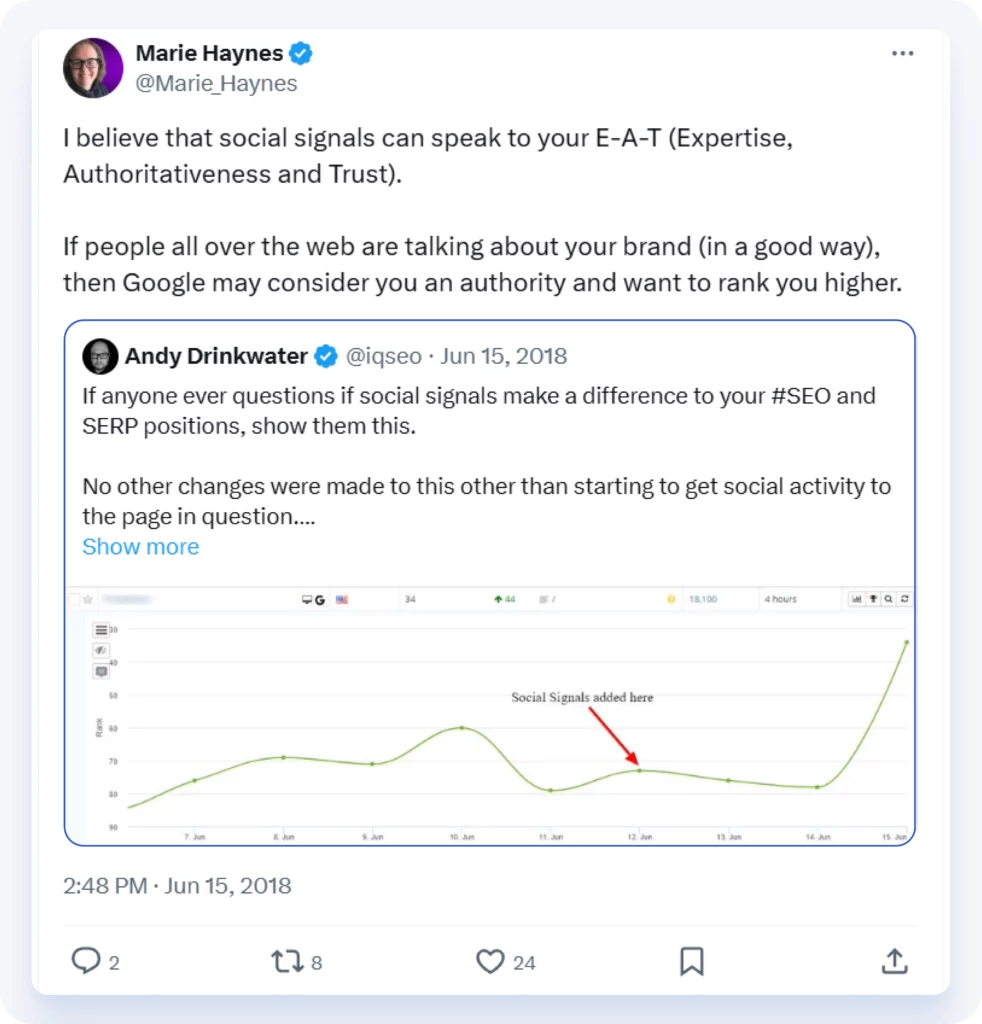
Even if these signals don't matter, promoting your content on these channels brings referral traffic to your website and increases your brand awareness, propelling the marketing flywheel.
Conclusion
Ranking high without backlinks is possible for low-competition keywords in very niche topics. You don't need links to rank in local search results, either. Or if you have established strong topical authority.
It’s possible - but not easy.
Your content must still be valuable, well-written, and optimized for search. You need a well-performing website and promote your content via other channels.
However, In highly competitive niches like SaaS or legal services, successful SEO without link building is a big ask. A strong backlinks profile is essential to compete for the top spots in search engine results.
If you're in such a niche and need help with your link-building strategy, Editorial.Link can help. Get in touch to arrange a free chat!




